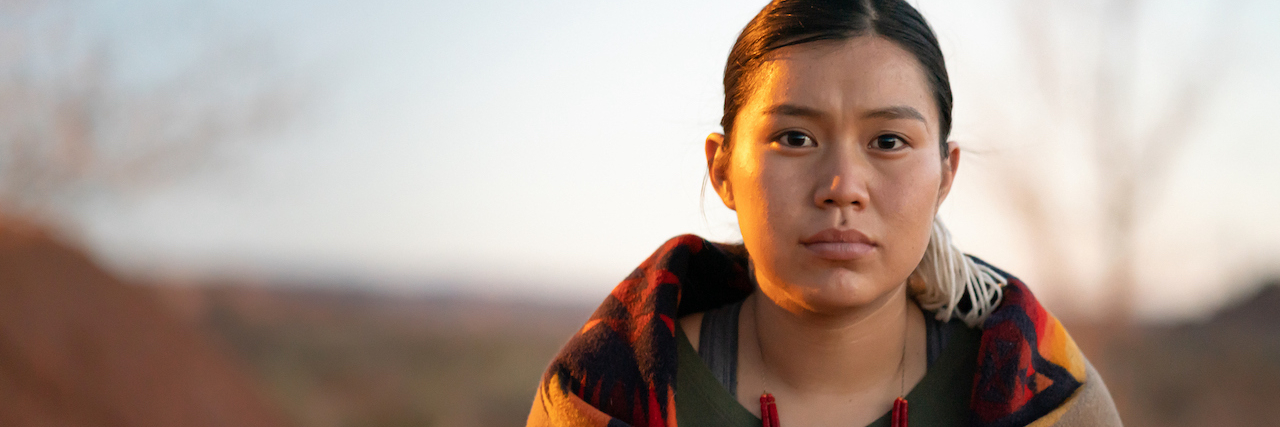Why I Won't Be Silent About the Suicide of Indigenous Men Like My Father
One of the last memories I have of my father is him sitting on the edge of my bed, strumming his acoustic guitar and singing “Bridge Over Troubled Water” while I was going to sleep.
I remember his long hair touching his shoulders, the tank top he was wearing because of the humid summer nights, and his bare foot moving with the music, keeping time. That was considered “our song,” our bedtime routine. Little did I know later in life it would be completely off limits to me as it could launch me into a roller coaster of emotions too painful to recover from.
Although I was too young to know at the time, my father was an alcoholic, a highly functioning alcoholic. He had struggled with severe depression his entire life, but being raised in a strict military home, it was not something that was discussed, accepted, much less sought professional help for. He became an alcoholic as a form of self-medication. When life became too difficult for him to bear, he turned to whiskey. Although this is a known problem for Indigenous Americans, it was not something that was discussed. Alcoholism disproportionally impacts our population and alcohol-related deaths happen at a substantially higher rate, but still, it was not discussed. He would have months where he was completely fine. Happy, playful. We would sing, he would make up songs with my name in them and we would sing them loudly, laughing. He taught me how to dance, we danced in the kitchen to the Chantilly Lace and talked about what song he would walk me down the aisle to (Uptown Girl).
He was an activist for tribes, a public speaker, and he would give resounding talks to large crowds. He seemed larger than life to me. But there was a downside that I didn’t see. That my mother worked hard to hide in her attempt to give me a “normal life.” During that time, he was “gone for work” for weeks at a time. I would get occasional phone calls from him where it sounded like he was crying, but I thought maybe he was homesick, so I would tell him what I did at school or we would sing.
One time he didn’t come home. We had been expecting him because it was my birthday. Early that morning, we received a call that he had been pulled over for drunk driving and was arrested. While arrested, still inebriated, he had killed himself in jail during the early hours of my birthday. The rest of the days were a whirlwind. Truth be told, I don’t remember a lot about that time. Once the funeral was done, we were told we weren’t allowed to discuss how he died. We were told it was better to say he died in a car wreck, and better not to talk about him at all anymore. It felt as if there was a conspiracy of silence surrounding everything that was him.
Later my mother and my future stepfather did everything in their power to make sure my birthdays were festive and bright, but the shadow of my dad remained. It wasn’t until I was older, in my 20s and in college, that I started reading about suicide, realizing why there was a conspiracy of silence around it. Why it was considered taboo to discuss mental health, why people viewed it as shameful. Despite the fact the suicide rate is 3.5% higher in indigenous populations and we have been widely considered the group at highest risk, it was not discussed growing up. I made it my mission in life to change that. I became a nurse, work with seriously ill people, and speak on health disparities in indigenous patients — the high risks of indigenous youth, mental illness stigma, substance abuse, and suicide risk.
I will never know what was going through his mind leading up to that fateful moment in the middle of the night. I will never know if he meant to do that on my actual birthday. I will tuck it away with all the other unanswered questions about him. But one thing I do to honor him is talk about him openly and freely. More so, I talk about mental illness struggles with my three sons, his grandchildren who look like him. He never got to know them, or the laughter and happiness in their faces, but we speak of him often. He lives on through them.
Wherever you are dad, I hope you found the peace you never attained in this life.
— Your Silver Girl
Getty image by THEPALMER

